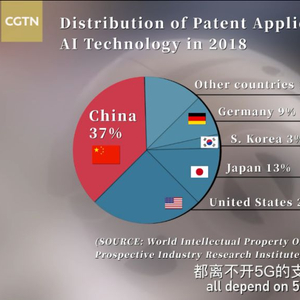 视频—在AI全球竞争中占据优势 中国为什么能
视频—在AI全球竞争中占据优势 中国为什么能
原标题:中国在人工智能全球竞争中占据优势 | 中国为什么能
开放的中国正成为人类共同探讨人工智能方向的重要地标。
中国是全球最早将5G商用服务落地的国家之一,中国的通信行业引领着全球的5G技术趋势。截至9月初,华为在全球范围内已获得50多个5G商用合同,与世界共享中国的创新成果。

5G带来的不仅是更快的速度和海量的数据,它还是驱动人工智能技术的有力引擎——工业互联网、物联网、车联网等人工智能应用场景都离不开5G的支持。在转变发展方式、优化经济结构、转换增长动力的攻关期,中国迫切需要新一代人工智能等重大创新添薪续力。
中国为什么能在人工智能的全球竞争中占据优势?请点击上方视频观看“中国为什能”之“人工智能”篇。
AI research is increasingly gaining traction in a growing number of countries because AI is thought to be the foundation of next generation technology。 A lot of hinges on AI development: competitiveness of companies, increase in industrial productivity, protection of national security and solving social challenges.5G, which is expected to support various kinds of AI applications in the future, is also one of the hottest and most competitive fields today。 China, without a doubt, has a leg up on other countries, after a number of European nations adopted its standard and technology as their first choice in 5G deployment。
人工智能技术大有前景2019年,美国科技智库数据创新中心发布的报告显示,在数据和商业化应用方面,中国有32%的企业应用人工智能,而美国和欧盟分别为22%和18%。

以图像识别、物体跟踪和无人驾驶等为代表的人工智能技术正渗透进中国各行各业。

2018年,中国人工智能市场规模为17.6亿美元,预计到2023年,这一规模将达到119亿美元。中国拥有世界规模最大的高铁列车系统,它是人工智能技术与传统列车技术的结合,可以每秒处理数十万业务量,每小时处理数百万客流量的数据。
Thirty-two percent of the Chinese firms have successfully adopted Artificial Intelligence (AI) into their business process, followed by the United States (22 percent) and the European Union (estimated 18 percent), according to a 2019 report from U.S。-based think tank Center for Data Innovation (CDI)。China‘s AI market will reach 11.9 billion U.S。 dollars by 2023, up from 1.76 billion U.S。 dollars in 2018, according to IDC’s latest report in May。
中国将发展人工智能、5G上升至国家战略在2019中国国际智能产业博览会上,工业和信息化部人才交流中心发布了《人工智能产业人才岗位能力标准》,显示在高端尤其是顶尖人才方面,中国与发达国家依然有较大差距,中国人工智能产业人才将迎来百万级缺口。

2017年,中国政府在 《新一代人工智能发展规划》中提出,到2030年,中国的人工智能理论技术与应用总体将达到世界领先水平,中国将成为世界主要人工智能创新中心。2019年中国《政府工作报告》提出,要打造工业物联网平台,为制造业转型升级赋能。工业物联网通过智能机器间的连接,把人、数据和机器连接起来,让世界更快速、更安全、更清洁且更经济。

在2019世界人工智能大会上,中国长三角G60工业物联网创新应用体验中心建设启动,中国工业智能的脚步正在不断加快。
China‘s strategy for the cutting-edge technologies was set several years ago under the framework of the “13th Five-Year Plan” (2016-2020) and “Made in China 2025,” two state-level initiatives supporting the country’s technology innovation。
After losing the battleground in the 1G and 2G eras, playing catch-up in 3G and 4G mobile technologies, China has been invested in the development of the 5G network to be a leading innovator.In 2013 when the Ministry of Industry and Information Technology (MIIT), along with the National Development and Reform Commission (NDRC) and the Ministry of Science and Technology, jointly founded the IMT-2020 (5G) Promotion Group, companies, telecom operators and tech researchers teamed up with peers from the U.S。, Europe, Japan, and South Korea to push forward the formulation of a global unified 5G standard。

In 2017, Chinese Premier Li Keqiang highlighted 5G as one of the emerging industries to be accelerated in his government work report。 The same year, the MIIT issued the 5G Development Guidance document to make 5G an important infrastructure for China‘s economic and social development。
“Chinese operators see their job as implementing government policy, whereas most global telecom companies try to balance competitive factors and will naturally invest at a slower pace,” Chris Lane, a research analyst for investment management firm Sanford C。 Bernstein, told the MIT Technology Review。
人工智能发展面临挑战,但未来可期

未来十几年,人工智能领域将出现新一代训练有素的技术人员、科学家和研究人员,但是中国仍然需要提高创新能力。人工智能作为一个新兴领域,面临着一系列挑战,还有许多基础性的科技难题没有突破。但它的深远影响必将体现在经济发展、社会进步和全球治理等方面。中国高度重视创新发展,把新一代人工智能作为推动科技跨越式发展、产业优化升级、生产力整体跃升的驱动力量。
China has already invested over 100 billion U.S。 dollars in 4G from 2013 to 2018, according to Goldman Sachs, and is expected to invest another 150 billion U.S。 dollars in its 5G network through 2025.The domestic AI industry has attracted 60 percent of all global investment from 2013 to the first quarter of 2018, a report from Tsinghua University shows。 In addition, the MIIT plans to allocate 950 million U.S。 dollars annually to fund strategic AI projects.But from a comprehensive perspective, China still lags behind in terms of AI basic research, talent pool and hardware development – though this is set to change。
开放的中国正成为全球人工智能企业的“乐园”,也将成为人类共同探讨人工智能方向的重要地标。


